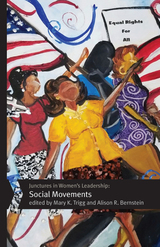3 books by Guy-Sheftall, Beverly

Building Womanist Coalitions
Writing and Teaching in the Spirit of Love
Edited by Gary L. Lemons
University of Illinois Press, 2019
Over the last generation, the womanist idea--and the tradition blooming around it--has emerged as an important response to separatism, domination, and oppression. Gary L. Lemons gathers a diverse group of writers to discuss their scholarly and personal experiences with the womanist spirit of women of color feminisms. Feminist and womanist-identified educators, students, performers, and poets model the powerful ways that crossing borders of race, gender, class, sexuality, and nation-state affiliation(s) expands one's existence. At the same time, they bear witness to how the self-liberating theory and practice of women of color feminism changes one's life. Throughout, the essayists come together to promote an unwavering vein of activist comradeship capable of building political alliances dedicated to liberty and social justice. Contributors: M. Jacqui Alexander, Dora Arreola, Andrea Assaf, Kendra N. Bryant, Rudolph P. Byrd, Atika Chaudhary, Paul T. Corrigan, Fanni V. Green, Beverly Guy-Sheftall, Susan Hoeller, Ylce Irizarry, M. Thandabantu Iverson, Gary L. Lemons, Layli Maparyan, and Erica C. Sutherlin
[more]

Embracing Queer Students’ Diverse Identities at Historically Black Colleges and Universities
A Primer for Presidents, Administrators, and Faculty
Steve D. Mobley
Rutgers University Press, 2025
Embracing Queer Students’ Diverse Identities at Historically Black Colleges and Universities: A Primer for Presidents, Administrators, and Faculty is both a call to action and a resource for Historically Black College and University (HBCU) leaders and administrators, focusing on historical and contemporary issues related to expanding inclusionary policies and practices for members of HBCU communities who identify as lesbian, gay, bisexual, transgender, and queer (LGBTQ+). The essays, by HBCU presidents, faculty, administrators, alumni, and researchers, explore the specific challenges and considerations of serving LGBTQ+ students within these distinct college and university settings, with the ultimate goal of summoning HBCU communities, higher education scholars, and scholar-practitioners to take thoughtful and urgent action to support and recognize LGBTQ+ students. With this book as a primary resource, HBCUs can work toward becoming fully inclusive campus communities for all of their students.
[more]

Junctures in Women's Leadership
Social Movements
Trigg, Mary K
Rutgers University Press, 2016
2016 Choice Outstanding Academic Title
From Eleanor Roosevelt to feminist icon Gloria Steinem to HIV/AIDS activist Dazon Dixon Diallo, women have assumed leadership roles in struggles for social justice. How did these remarkable women ascend to positions of influence? And once in power, what leadership strategies did they use to deal with various challenges?
From Eleanor Roosevelt to feminist icon Gloria Steinem to HIV/AIDS activist Dazon Dixon Diallo, women have assumed leadership roles in struggles for social justice. How did these remarkable women ascend to positions of influence? And once in power, what leadership strategies did they use to deal with various challenges?
Junctures in Women’s Leadership: Social Movements explores these questions by introducing twelve women who have spearheaded a wide array of social movements that span the 1940s to the present, working for indigenous peoples’ rights, gender equality, reproductive rights, labor advocacy, environmental justice, and other causes. The women profiled here work in a variety of arenas across the globe: Planned Parenthood CEO Cecile Richards, New York City labor organizer Bhairavi Desai, women’s rights leader Charlotte Bunch, feminist poet Audre Lorde, civil rights activists Daisy Bates and Aileen Clarke Hernandez, Kenyan environmental activist Wangari Maathai, Nicaraguan revolutionary Mirna Cunningham, and South African public prosecutor Thuli Madonsela. What unites them all is the way these women made sacrifices, asked critical questions, challenged injustice, and exhibited the will to act in the face of often-harsh criticism and violence.
The case studies in Junctures in Women’s Leadership: Social Movements demonstrate the diversity of ways that women around the world have practiced leadership, in many instances overcoming rigid cultural expectations about gender. Moreover, the cases provide a unique window into the ways that women leaders make decisions at moments of struggle and historical change.
[more]
READERS
Browse our collection.
PUBLISHERS
See BiblioVault's publisher services.
STUDENT SERVICES
Files for college accessibility offices.
UChicago Accessibility Resources
home | accessibility | search | about | contact us
BiblioVault ® 2001 - 2024
The University of Chicago Press









